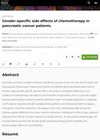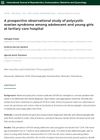 March 2023 in “Scholars international journal of obstetrics and gynecology”
March 2023 in “Scholars international journal of obstetrics and gynecology” PCOS is a complex condition that affects women's hormonal balance and metabolism, requiring lifestyle changes and medical management.
 November 2023 in “Deleted Journal”
November 2023 in “Deleted Journal” Multimedia education greatly improves women's knowledge and management of PCOS.
 2 citations,
July 2023 in “Frontiers in Endocrinology”
2 citations,
July 2023 in “Frontiers in Endocrinology” The review found that current care models for PCOS are not fully effective and more research is needed, especially in low-income countries.
 1 citations,
July 2023 in “F&S Reviews”
1 citations,
July 2023 in “F&S Reviews” Some common medications may harm male fertility by affecting hormones, sperm production, and sexual function.
 4 citations,
October 2021 in “Canadian Journal of Physiology and Pharmacology”
4 citations,
October 2021 in “Canadian Journal of Physiology and Pharmacology” Women with pancreatic cancer are more likely to have certain side effects from chemotherapy than men.
 1 citations,
October 2022 in “Journal of food and nutrition research”
1 citations,
October 2022 in “Journal of food and nutrition research” Cinnamon may help manage obesity and improve conditions related to Polycystic Ovary Syndrome (PCOS).
 June 2023 in “Journal of multidisciplinary sciences (Online)”
June 2023 in “Journal of multidisciplinary sciences (Online)” PCOS is linked to a higher risk of endometrial cancer but not ovarian or breast cancer, and more research is needed on its role in cancer development and treatment effects.
 December 2023 in “Migration letters”
December 2023 in “Migration letters” Herbal treatments can help manage PCOS symptoms.
 1 citations,
January 2023 in “Metabolites”
1 citations,
January 2023 in “Metabolites” Changes in gut bacteria can contribute to the development of Polycystic Ovary Syndrome (PCOS), affecting metabolism, immunity, and causing inflammation. Treatments may involve adjusting these factors.
 883 citations,
August 2016 in “Nature Reviews Disease Primers”
883 citations,
August 2016 in “Nature Reviews Disease Primers” Polycystic Ovary Syndrome (PCOS) is a common condition in women that can cause metabolic, reproductive, and psychological issues, and requires lifestyle changes and medication for management.
 February 2023 in “IntechOpen eBooks”
February 2023 in “IntechOpen eBooks” Testosterone replacement therapy helps manage deficiency and has various methods, but requires careful monitoring to avoid side effects.
 June 2024 in “IntechOpen eBooks”
June 2024 in “IntechOpen eBooks” Myo-inositol-based treatments greatly improve pregnancy chances for women with PCOS.
 December 2022 in “International Journal of Current Science Research and Review”
December 2022 in “International Journal of Current Science Research and Review” Polycystic Ovary Syndrome (PCOS) is a common but often undiagnosed disorder in women that can cause irregular periods, infertility, and other symptoms, and can be managed with lifestyle changes, medication, and sometimes surgery.
 October 2017 in “Springer eBooks”
October 2017 in “Springer eBooks” A thorough initial check-up is essential before sperm banking to ensure the best chance of preserving good quality sperm.
 September 2022 in “Journal of Contemporary medical practice”
September 2022 in “Journal of Contemporary medical practice” Most women with Polycystic Ovarian Disease have trouble getting pregnant due to hormonal imbalances, but lifestyle changes and certain drugs can help.
 August 2022 in “International journal of reproduction, contraception, obstetrics and gynecology”
August 2022 in “International journal of reproduction, contraception, obstetrics and gynecology” The study found that 7.21% of young girls have polycystic ovarian syndrome, with symptoms like irregular periods, abnormal hair growth, and acne. Early diagnosis is important to prevent long-term complications.
 4 citations,
July 2022 in “Medicina-lithuania”
4 citations,
July 2022 in “Medicina-lithuania” Women with Polycystic Ovary Syndrome (PCOS) often have higher levels of anxiety and depression, especially if they live in rural areas, have less education, don't have children, are over 30, or are obese.
 1 citations,
June 2012 in “Springer eBooks”
1 citations,
June 2012 in “Springer eBooks” Acupuncture may improve reproductive and metabolic functions in PCOS without negative side effects, but more research is needed to confirm its effectiveness.
 1 citations,
January 2022 in “IntechOpen eBooks”
1 citations,
January 2022 in “IntechOpen eBooks” Different PCOS types respond uniquely to infertility treatments, with some having lower pregnancy rates and higher risks of complications.
 December 2021 in “International Journal of Biomedicine”
December 2021 in “International Journal of Biomedicine” Hyperprolactinemia should be treated before confirming a PCOS diagnosis.
 September 2022 in “Women's healthcare”
September 2022 in “Women's healthcare” PCOS is managed by lifestyle changes and personalized medication to improve symptoms and fertility.
 1 citations,
January 2022 in “Journal of experimental and clinical medicine”
1 citations,
January 2022 in “Journal of experimental and clinical medicine” PCOS is linked to diabetes and insulin resistance, and managing AGEs may help treat related symptoms.
 68 citations,
January 2022 in “International Journal of Molecular Sciences”
68 citations,
January 2022 in “International Journal of Molecular Sciences” PCOS management includes lifestyle changes and medications, with ongoing research into repurposed drugs for better treatment options.
 December 2021 in “Journal of oncology research reviews & reports”
December 2021 in “Journal of oncology research reviews & reports” Polycystic Ovary Syndrome (PCOS) can lead to diabetes, heart disease, cancer, and mental health problems.
 5 citations,
September 2021 in “Cureus”
5 citations,
September 2021 in “Cureus” Depression in women with Polycystic Ovarian Syndrome (PCOS) is linked to insulin resistance and hyperandrogenism, and managing these can help reduce depression. Lifestyle changes and Cognitive Behavioral Therapy can be effective treatments.
 36 citations,
October 2021 in “Frontiers in Endocrinology”
36 citations,
October 2021 in “Frontiers in Endocrinology” Insulin resistance and high male hormone levels are major causes of Polycystic Ovary Syndrome.
 36 citations,
May 2021 in “Nutrients”
36 citations,
May 2021 in “Nutrients” Natural molecules like inositols, resveratrol, vitamins, and omega-3 fatty acids may help manage Polycystic Ovary Syndrome (PCOS), but their effects vary and need more exploration.
 200 citations,
October 2009 in “European journal of endocrinology”
200 citations,
October 2009 in “European journal of endocrinology” Metformin helps manage polycystic ovary syndrome by improving insulin resistance and ovulation, but more research is needed on its full effects.
 2 citations,
March 2020 in “bioRxiv (Cold Spring Harbor Laboratory)”
2 citations,
March 2020 in “bioRxiv (Cold Spring Harbor Laboratory)” HAIR may cause fetal loss by triggering different cell death processes in the uterus and placenta.
 6 citations,
January 2015 in “Journal of regenerative medicine & tissue engineering”
6 citations,
January 2015 in “Journal of regenerative medicine & tissue engineering” The review concludes that innovations in regenerative medicine, tissue engineering, and developmental biology are essential for effective tissue repair and organ transplants.






























